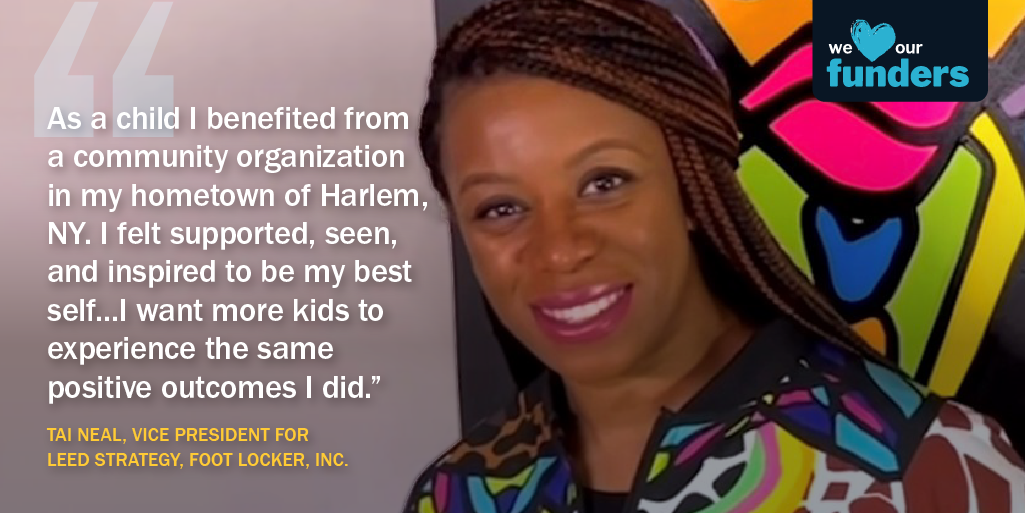As part of its LEED Initiative, a $200 million pledge to support the Black community, Foot Locker, Inc. teamed up with LISC to provide grants to nonprofit community organizations that offer a range of services for young people. In a Q+A with Tai Neal, vice president for LEED Strategy at Foot Locker, Inc., we learn why supporting youth in under-resourced communities is so important to Foot Locker, and to Neal.
There’s no question that the world is an increasingly complex place to navigate when you’re young, especially in under-resourced communities where support and opportunity are scarce.
To kickstart the kinds of opportunities youth need, LISC and Foot Locker, Inc. joined forces to launch the Foot Locker Foundation Community Empowerment Program, which funds nonprofit community organizations offering a range of services for young people, including health and wellness, education and life skills, mentoring, and career development. The program aims to bridge racial equity gaps and promote youth empowerment and community wellness—all while nurturing community-based organizations led by people of color.
In its first two years, the competitive grant program has awarded $2.7 million in grants to 36 organizations across the country. As we gear up for another round of grantmaking (applications are due by August 30, 2023), LISC checked in with Tai Neal, vice president for LEED Strategy at Foot Locker, Inc. Check out our Q+A below to learn why supporting youth development is so important to Foot Locker, and to Neal.

Why has Foot Locker made a commitment to empower youth in underserved communities?
Foot Locker is committed to investing in the next generation of change-makers and helping create a world where everyone can thrive. This commitment extends beyond words and is deeply rooted in our culture – evident in our ability to operate and sustain an inclusive and diverse organization, benefiting internal and external stakeholders alike for nearly 50 years.
At Foot Locker, we feel a responsibility to drive meaningful and lasting change across our company and the communities we serve by empowering young people. We use a multi-pronged approach, anchored by our Foot Locker LEED Initiative, a $200 million pledge to invest in, amplify, and empower the Black community, which has played a pivotal role in cultivating sneaker culture as we know it today. Through LEED, we’ve partnered with LISC to launch the Foot Locker Foundation Community Empowerment Program to support local BIPOC-led organizations that believe in the promise of the youth from underserved communities.
Why did Foot Locker choose LISC for this partnership?
LISC is one of the country's largest community development organizations, which helps build vibrant, inclusive communities and holds a four-decade record of impact and high levels of due diligence, governance, and transparency. We selected LISC as a partner for our first national program based on their commitment to diversity, presence in key Foot Locker communities nationwide, and ability to partner with grassroots organizations to connect funding with real community needs. When Foot Locker team members visited or volunteered with organizations funded through our program with LISC, we saw firsthand the passion and commitment LISC brought to advancing racial equity and closing gaps in health, wealth, and opportunity for young people.
What does it mean to you, on a personal level, to be part of efforts to create a brighter future for young people?
It is through community-based organizations that youth from underrepresented communities can feel empowered and supported, resulting in an increased sense of trust, which ultimately strengthens the heart of the community. As a child I benefited from a community organization in my hometown of Harlem, NY. I felt supported, seen, and inspired to be my best self. In addition to offering cultural experiences, the organization provided a safe space for children in Harlem to learn and grow. This organization helped shape me into the woman I am today, and I want more kids to experience the same positive outcomes I did.
